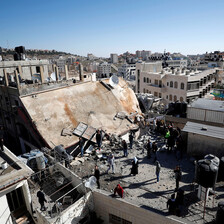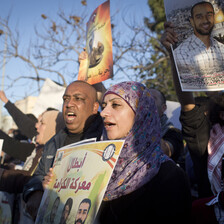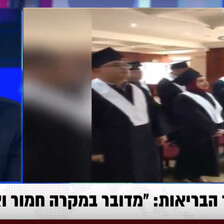The Electronic Intifada Jerusalem 24 September 2013

Activists in Ramallah hold a mock funeral to protest the Palestinian Authority’s continued negotiations with Israel and coordination with its military, 28 August.
ActiveStillsSince the resumption of the most recent episode of the bogus, US-brokered “peace” talks between Israel and the Palestinian Authority in August, five Palestinians have been murdered by Israeli occupation forces. The latest was 22-year-old Islam Toubassi, assassinated in Jenin refugee camp on 17 September.
Among the five martyrs were three young Palestinian men killed on the morning of 26 August in the Qalandiya refugee camp, near Ramallah.
That day now seems like any another day, a painful — albeit distant — memory for some, and an occasion of unspeakable grief that turned the lives of three families upside down.
It should not be normal for heavily-armed soldiers to invade a refugee camp at dawn. Nor should it be normal for an occupying army to kill three unarmed Palestinians in cold blood and to injure dozens of other civilians, armed with nothing but rocks. The daily frequency with which Israel conducts those raids, however, makes this kind of terror and intimidation routine.
Israel is committing all of these crimes while the self-avowed Palestinian Authority unashamedly continues the “peace” talks charade and security collaboration with the Israeli occupation.
Lip service
Meanwhile, Palestinians are left with nothing but pointless lip service from Mahmoud Abbas. After every violation, he claims that those violations might damage the futile “peace” process.
Abbas’ shy condemnation of Israel means nothing for the families of Rubeen Zayid, Younis Jahjouh and Jihad Aslan, the three young Palestinians killed by Israeli occupation soldiers in Qalandiya refugee camp on 26 August.
Witnessing the funerals of three martyrs is never easy, let alone writing about the experience objectively.
How can anyone accurately describe the suffering of a mother who had just lost her eldest son? How can one express support for a young woman whose husband — and the father of her son — was killed on his way to work for no crime but being a Palestinian?
How could anyone remain objective while listening to an elderly woman inconsolably begging her slain nephew to come back: “Jihad, my love, why did you leave me? Who will look after me now that they have taken your life away?”
How is it possible to describe the bitterness of watching journalists race to take pictures of sobbing Palestinian women, reminding me of these lines by Mahmoud Darwish: “To them my wound has become an exhibit for a tourist who loves collecting photographs.”
Parallel lines?
And is there any polite manner in which you can comment on the speech of one Fatah official who attended the funeral and declared in his speech: “We believe that negotiations and resistance are parallel lines?”
There are moments that leave us completely and utterly speechless, unable to articulate the turmoil of emotions that overwhelm us. And even though it seems that Palestinians have gotten used to grief after 65 years of an ongoing Nakba or catastrophe, this should not in an way normalize the killing of one individual.
Jihad Aslan was just 19 but he had already lived through a lifetime of suffering. He was arrested by the Israeli occupation at the age of 15, spending a couple of years in jail, according to his relatives.
He was shot in his leg by Israeli soldiers briefly after his release. His arrest and injury meant that he couldn’t finish high school or find a job due to a permanent disability in his foot.
As the fatal raid began, he took two injured relatives to an ambulance before being shot himself and later succumbing to his wounds in a hospital.
For many, Jihad’s story is nothing special. He would go down as just another statistic, just another number in the endless lists of victims of the “Palestinian-Israeli conflict.” His story, the story of thousands of Palestinian youngsters whose lives were destroyed by a callous occupation, is irrelevant for an “international community,” whose only concern is maintaining Israel’s security.
Remembering is essential
Remembering Jihad Aslan and other victims of Israel’s colonialism is essential, not just because of the recent clashes in Hebron and the arrest campaigns that followed the killing of two Israeli soldiers in the past week.
The US State Department condemned the killings of the soldiers as “terror,” a word it has never used to describe Israel’s routine killing and maiming of Palestinian civilians.
This reflects perverse thinking in many “Western” circles that turns the colonial aggressor and its army into the victim and the victim into the aggressor.
But Palestinians, like all occupied and colonized peoples, have a legitimate right to resist.
In 1970, the UN General Assembly affirmed “the legitimacy of the struggle of peoples under colonial and alien domination recognized as being entitled to the right of self-determination to restore to themselves that right by any means at their disposal.” Until Palestinians are free, that right applies to them too.
In no way can the killing of armed occupation soldiers be equated with the killing of indigenous, occupied people. These events do, however, highlight the hypocrisy of world powers that treat resistance as a crime and occupation as routine.
Recent events in Hebron and the clashes in Jenin and Qalandiya refugee camps before them show that if a third intifada does break out, it will start either in Hebron or the refugee camps. These places are targeted by both the Israeli occupation and its proxy, the Palestinian Authority. And they are always the first to rise up against both.
Budour Youssef Hassan is a Palestinian anarchist and law graduate based in occupied Jerusalem. She can be followed on Twitter @Budour48.






Comments
There no greater charade. It's unbelievable how Erekat insists t
Permalink rami replied on
o keep going on. He should read this:
http://972mag.com/the-man-who-...
Israel's killing of 5 Palestinians
Permalink stephan ostanock replied on
thank you for the article! Something is very wrong in the court system! thyat Israel is using, any why do they get away with it! The world is insane to tolerate this! So would love to read your writers! thank you